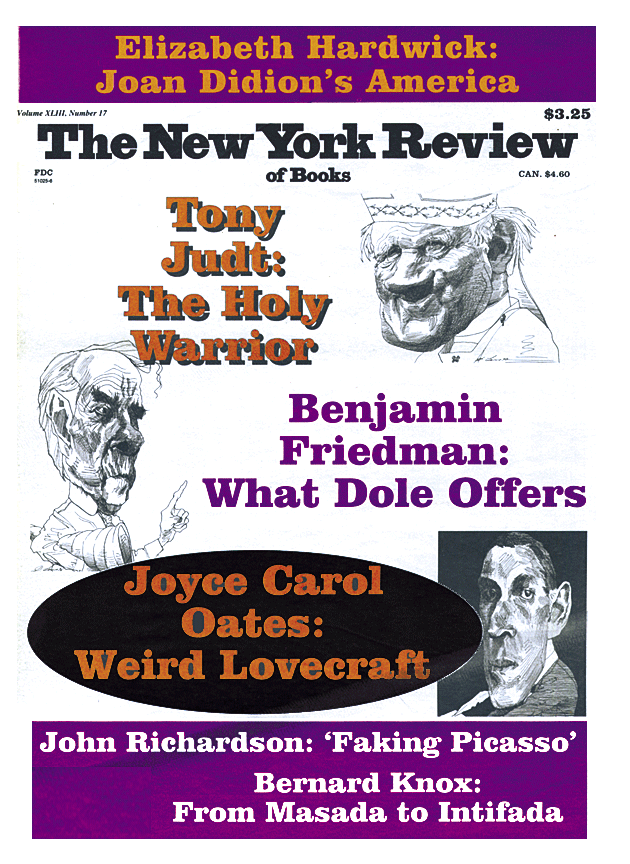In response to:
Fruit Salad from the June 1, 1963 issue
To the Editors:
In May 1963, there appeared in your journal a piece of malice posing as a review of my first novel, City of Night. The “review” was written by Alfred Chester. You titled it “Fruit Salad.” I was young, baffled by the personal assault, and I did not protest. I’m no longer young, I understand the attack, and I protest the abuse and its recent extension.
Chester questioned my very existence, a twist of meanness seized by others of his ilk in The New Republic, The Village Voice, and in tabloids. Consequently, impostors emerged, their behavior attributed to me in gossip columns. (I had chosen to retain my privacy.) The impact of Chester’s “review” was possible because it appeared in your journal.
City of Night became an international bestseller, has never been out of print, is taught in literature courses.
Chester’s “review” would have become at most a ridiculed footnote if you had not dug it up in 1988 in your collection of reviews, Selections. Again you exposed Chester’s leering at my photograph, his giddy tone (“Oooo, Mary”), his attempted disparagement even of my name. The doubting of my existence was more offensive when I had gone on to write many more books. The original headline updated your imprimatur on the word “fruit.”
You answered my objection: “…we should have removed the title. I’m sorry.”
In May this year you offered a copy of Selections, with a new cover, inviting subscribers to learn what your reviewers wrote about Burroughs’s and Baldwin’s books considered “modern classics.” Since City of Night is also referred to as a “modern classic,” I assumed Chester’s “review” was omitted. It was intact. A letter from you answering mine maintained that the edition was—“apparently”—not a new printing. Still, Chester’s performance was extended.
Responding to an interview with me in Poets &Writers, Edward Field, Chester’s once-editor, wrote to the magazine: “It was with a good deal of sadness that I read…of the damage done to City of Night by the late Alfred Chester’s bitchy review…. It was a considerable understatement to call Chester ‘notoriously disturbed.’… He was mad…cruel and destructive, as his review demonstrates…. In explaining and apologizing for [Chester’s] disservice to Rechy, an author I greatly admire, I should point out that the title of the offending review…was not Alfred Chester’s but the New York Review of Books’s….”
In his United States:Essays 1954-1994, Gore Vidal, discussing Selections, labels Chester’s “review” “absolutely unfair,” yet “murderously funny…a trick that only a high critic knows how to pull off”—a trick Mr. Vidal goes on to claim he, too, can perform. I reminded Mr. Vidal that he has been the object of “murderously funny” criticism. I asked him whether not even the title of the “review” had made him wince. He wrote back:”I very much admire City of Night…. Also…I admire a kind of performance in criticism which is often plainly gratuitously destructive but at the same time a sort of art….Chester, a moral monster, one gathers, was, for a time, a master of this sort of thing…. I had forgotten about him entirely until I reread his ‘totally unfair’ piece and I’m afraid I succumbed yet again to his black arts…. I don’t even recall the offensive title.” Mr. Vidal’s approval of Chester’s malice—not art—remains in his volume.
Each time you exhume Chester’s spite on a novel that has proven him wrong, you condone his dishonorable motives, motives Chester makes clear in his “review”:
Categorizing the hustler in my novel as “the kind of person we now speak of as ‘someone incapable of love,’” Chester continues: “And, as with all these people, if you are hot for them enough, or bedeviled and tormented by them enough, and if you look and examine very hard, you will find that it is not at all true that they cannot love. They can; they do; alas, they love too much, which is the problem, for they are always loving someone else.” But never Chester.
John Rechy
Los Angeles, California
This Issue
October 31, 1996


